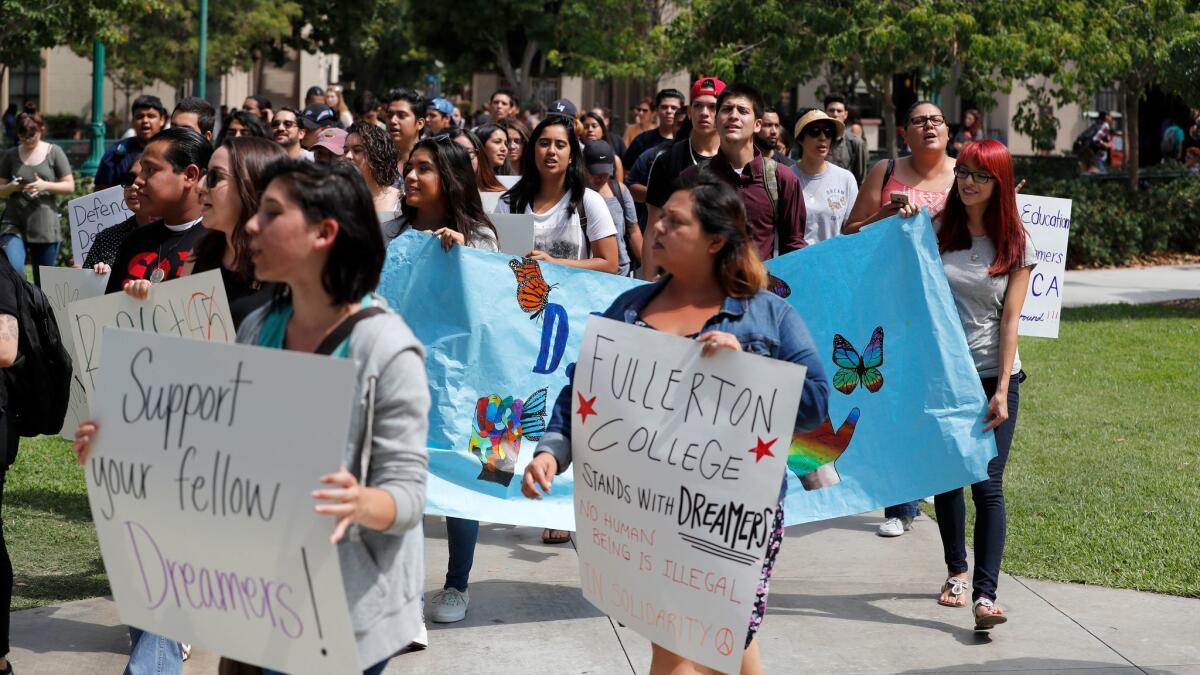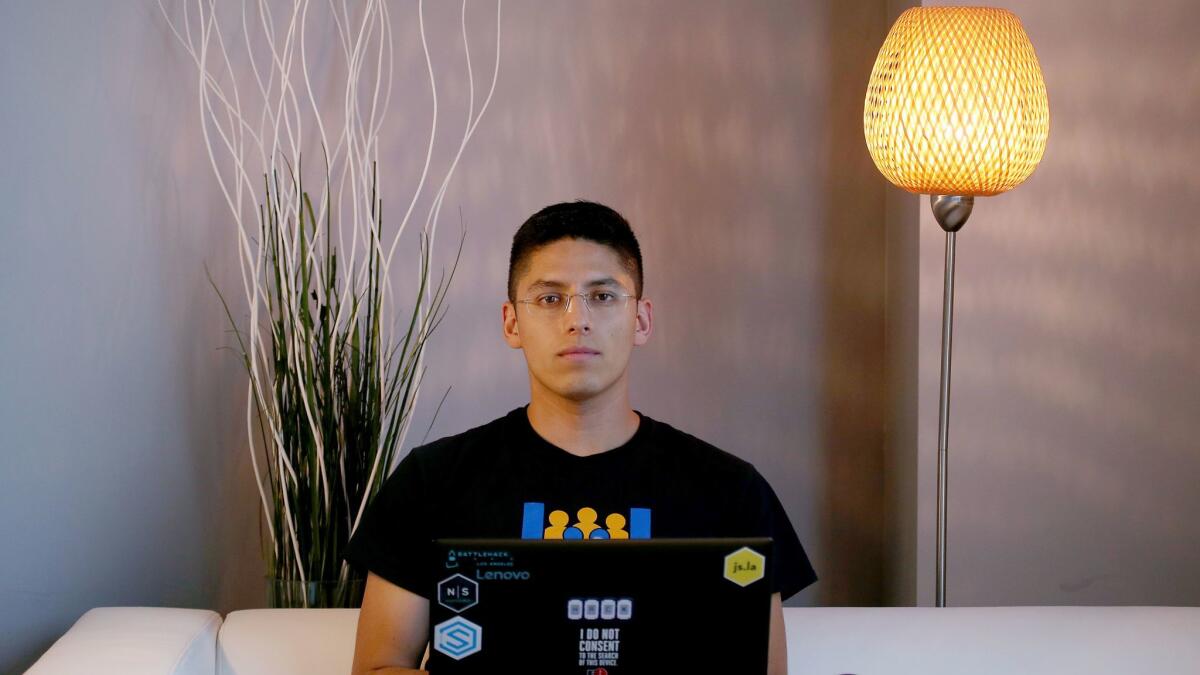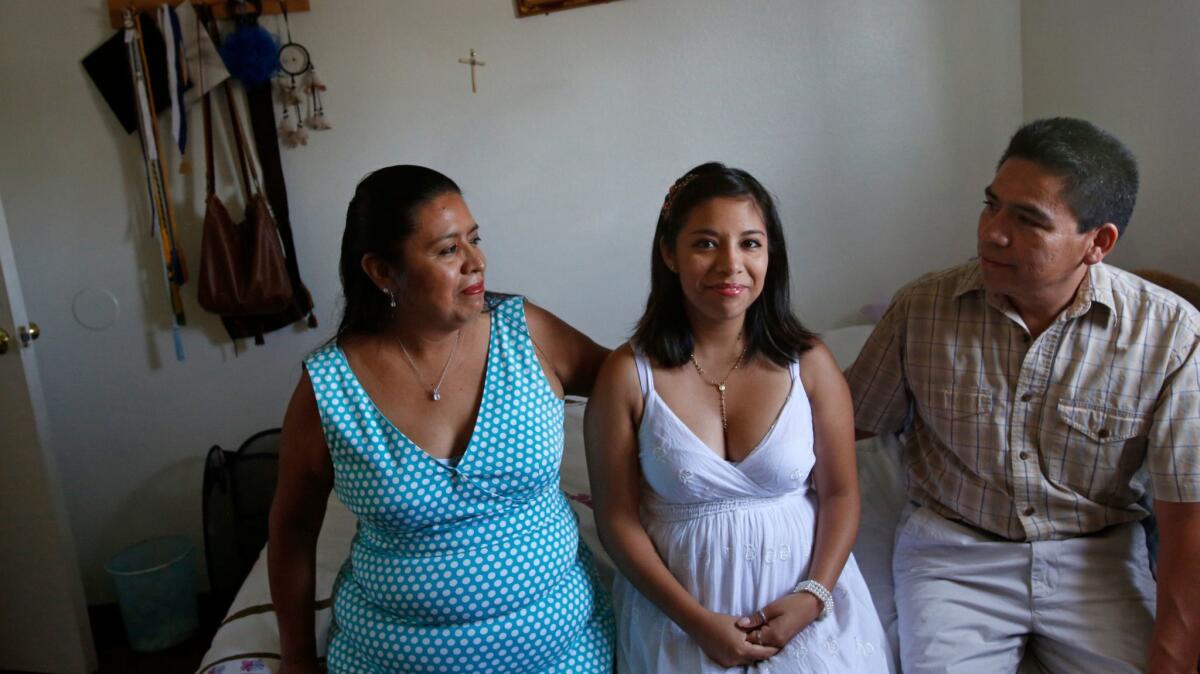DACA participants skeptical of Trump deal to provide legal status for ‘Dreamers’

- Share via
Justino Mora doesn’t consider the surprise Wednesday night negotiations between President Trump and Democratic leaders on a plan to save DACA a victory.
“It’s too early to say,” Mora, cofounder of the Los Angeles-based immigrant advocacy group UndocuMedia, said Thursday. He and other DACA participants shared skepticism and disapproval of the negotiations.
“I don’t trust the Trump administration because they’re always changing their mind,” he said. “We’re literally blinded. We don’t know what the deal really entails.”
Trump met for dinner Wednesday night with House Minority Leader Nancy Pelosi (D-San Francisco) and Senate Minority Leader Charles E. Schumer (D-N.Y.) to discuss a plan to enshrine DACA into law. DACA is the acronym for the Obama administration program that shielded from deportation nearly 800,000 immigrants who came to the U.S. illegally as children and provides them renewable two-year work permits.
“We’re working on a plan — subject to getting massive border controls,” Trump told reporters Thursday morning, adding that people want to see a legislative solution for the so-called Dreamers.
Shortly after the dinner, the two Democrats issued a statement saying that they had agreed with Trump to pursue legislation to legalize the status of Dreamers. They issued another statement saying that the details of border security remain to be negotiated.

Mora, 28, a DACA participant and UCLA graduate, came to the U.S. illegally at age 11 with his mother and two siblings. The family fled poverty and domestic violence in their home near Mexico City.
He was angered that DACA participants were not at the meeting with Trump, Pelosi and Schumer. He considered the agreement to beef up border security a bad strategy that could ruin the chances of a better deal on immigration reform.
“They’re compromising way before the fight even begins,” he said. “That’s exactly the problem with the Democratic Party — they want an early victory and are willing to throw everyone under the bus. Enforcement is not something that should be taken lightly.”
And he took issue with the back-and-forth between the Democrats and the White House on whether an agreement was actually reached. Trump tweeted early Thursday, “No deal was made last night on DACA. Massive border security would have to be agreed to in exchange for consent. Would be subject to vote.”
Despite the messy politics, Mora thinks there’s still a chance to get comprehensive immigration reform. He said the Democratic Party needs to erase the narrative of good and bad immigrants by ensuring that the parents of Dreamers are included in reform deals.
In the meantime, Mora said the frequent changes to his future are like a roller coaster ride.
“It feels like I’m in Six Flags every day,” he said.

Karla Estrada, 26, can relate. She braced herself for DACA’s end, always knowing the program would be temporary. The negotiations Wednesday threw her yet again.
“I don’t even know what I think anymore,” she said. “Trump is like an abusive ex.”
The DACA participant said she wonders what kind of agreement three politicians could come to over one night of negotiations. She worries that stepped up enforcement means more raids.
“I think that’s what Trump wants — credit, that he did something good,” she said. “They’re strategizing with our lives because they know if they pass something like this they’ll get some votes for the next election.”
Though DACA allowed Estrada to get a steady job with better pay, she wouldn’t consider a codified version of the program, which does not provide a path to citizenship, as cause for celebration.
“In Pelosi and Schumer’s briefs they didn’t mention a path to legalization,” she said. “They’re saying they want to enshrine DACA. What does that mean? Meaning they won’t give us a path to citizenship, so we’re just going to renew [the work permits] every two years forever? I won’t agree with or accept that deal. If they’re going to give us something, they’d better give us at least the DREAM Act.”
Pelosi said at a news conference that an eventual path to citizenship would be part of the legislation. But Trump, speaking on his return to Washington, said, “We’re not talking about that. We’re not talking about amnesty at all.”
Estrada, who works as a paralegal at an immigration law firm in Los Angeles, was brought illegally to the U.S. at age 5. Her parents moved back to Cuernavaca, Mexico, earlier this year, shortly after her brother’s voluntary departure — which allows deportable immigrants to leave the country before they’re issued final removal orders.
Estrada is the only remaining member of her immediate family in the U.S. She said passing the DREAM Act would be bittersweet. She worries that other Dreamers would stop fighting for comprehensive immigration reform if given their own chance at citizenship.
Still, she acknowledged that such a change would mean she could visit her family in Mexico and continue working in the U.S. without fear.
Luis Ojeda, a 27-year-old Fresno immigrant rights activist, sees the negotiations as a bait-and-switch. Despite gaining full-time employment through DACA and permission to attend his grandmother’s funeral in Colima earlier this year, he has always thought the program missed the mark.
Ojeda, two of his siblings and his parents crossed the border illegally when he was 4. The family struggled in Mexico. His father now works at a dairy near Fresno.
Left out of the program were people like his parents and some family members who have criminal convictions. He saw it as a maneuver by the Obama administration to gain support from those in the immigrant rights movement without making more of a serious attempt to fix the nation’s broken immigration system.
Wednesday’s negotiations, Ojeda said, are little more than an extension of that maneuver.
“Any more funding for enforcement just means more people are going to be deported,” he said, “and that’s not worth giving anyone a work permit.”
UPDATES:
7:05 p.m.: This article has been updated with additional comments from DACA participants.
This article was originally published at 11:25 a.m.
More to Read
Sign up for Essential California
The most important California stories and recommendations in your inbox every morning.
You may occasionally receive promotional content from the Los Angeles Times.











